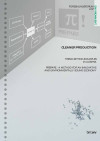Suchergebnisse
Energy Policies of IEA Countries - Austria -- 2007 Review

Since the last review in 2002, Austrian energy policy has seen many positive developments. Today, Austria counts among the IEA member countries with the highest share of renewable energy supply, thus increasing energy security and reducing CO2 emissions. Great progress has also been made in the utilisation of biomass for heat and electricity production. Nevertheless, many challenges remain.
Englisch
Contracting as a instrument for renovation

Development of contracting models for comprehensive renovation service packages.
IEA Hydrogen Task 42: Underground Hydrogen Storage
The IEA Hydrogen Technology Collaboration Program’s Task 42 on Underground Hydrogen Storage focuses on advancing the technical, economic, and societal viability of underground hydrogen storage in porous reservoirs, salt caverns, and lined-rock caverns.
IEA 4E TCP-PECTA: Power Electronic Conversion Technology (Working period 2024 - 2027)
The Power Electronic Conversion Technology Platform (PECTA) is one of 4 Platforms of the IEA 4E TCP. PECTA shall assess the efficiency benefit of the emerging WBG technology for different relevant power electronic applications and furthermore serves as an independent knowledge platform for policy makers and all kind of parties and stakeholders that are interested in WBG.
Living-city Joint-space-potential Salzburg
Exemplary transformation of a traffic abused open urban structure. The target was to develop a model through supplementary housing as well as social measures and measures for the surrounding.
Pilot project gaining-building-land Pongau
Gaining extra space for additional households through sustainable renovation and/or extension of 8 detached houses by integrating consulting, planning, energy efficiency concepts and financing.
IEA 4E Annex: Electric Motor Systems. Working period 2008 - 2011
Promotion of energy efficiency of poly-phase electric AC motors and motor systems in relevant applications as pumps, fans, compressors and mechanical drives that are generally used in industry, infrastructure and large buildings. This work also included new technologies such as frequency inverters (adjustable speed drive) and permanent magnet motors.
ERA-NET COFUND Smart Cities and Communities (2014 - 2019)
Smart Cities and Communities have been identified as key to achieving the energy efficiency targets for 2020 and 2050. The main objective of this ERA-NET COFUND is to stimulate successful practice and facilitate replicability within Smart Cities and Communities implementation projects and also across projects in order to achieve a technological shift in the current energy system and provide smart and integrated solutions for technology, government and society.
Seminar: Energy flexible buildings as a part of resilient low carbon energy systems
13. September 2023
Technology Centre Seestadt - aspern Seestadt, Seestadtstraße 27, 1220 Wien
This seminar is looking into the role of energy flexibility measures and solutions supporting buildings and building neighborhoods in demand response and their use of fluctuating renewable energy sources.
IEA 4E TCP-PECTA: Power Electronic Conversion Technology (Working period 2021 - 2024)
The Power Electronic Conversion Technology Annex (PECTA) is one of 4 Annexes of the IEA 4E TCP. PECTA shall assess the efficiency benefit of the emerging WBG technology for different relevant power electronic applications and furthermore serves as an independent knowledge platform for policy makers and all kind of parties and stakeholders that are interested in WBG.
IEA Bioenergy Conference 2021
29. November - 9. December 2021
Online
Bioenergy – a critical part of the path to carbon neutrality. The three-yearly conference of IEA Bioenergy will be held as a series of online sessions spread over two weeks. The central theme will be the role of biomass in the transition towards a carbon neutral society.
The Market-driven Circular & Bioeconomy
8. June 2021, 10:10 – 12:30 Uhr
Online
Partner event of the EU GREEN WEEK 2021.
IEA Hydrogen Task 45: Renewable Hydrogen Production
Due to the increasing pressure to replace fossil fuels with alternatives, the demand for renewable hydrogen supplies is also increasing. In this project, the state of the art of various established and innovative production paths will be collected, processed and then made available to the public.
IEA IETS Task 15: Industrial Excess Heat Recovery (Phase 4)
Excess heat recovery plays a crucial role in reducing emissions in industry. Through strategic planning and efficient process integration, companies can improve their energy efficiency and significantly reduce their carbon footprint. Task XV facilitates the international exchange of experience and knowledge between different companies. This identifies best practices to promote the implementation of energy-efficient technologies in industry.
IEA Hydrogen Task 48: Future demand of Hydrogen in Industry
The task provides an overview of the current and expected use of hydrogen in various industrial sectors. It evaluates the extent to which past and predicted developments in the use of hydrogen in industry deviate from the roadmaps of different countries. This information is important for both companies and policymakers and can support the ramp-up of hydrogen use and the decarbonization of the industrial sector.
Cleaner Production

Trend-setting examples in Austria PREPARE a method for an innovative and environmentally sound economy
Forschungsforum
4/1997
Herausgeber: BMVIT
Englisch, 6 Seiten
Downloads zur Publikation
IEA ECBCS Annex 49 Midterm Report (2010)

Low Exergy Systems for High-Performance Buildings and Communities
Englisch
IEA EBC Annex 66: Newsletter No. 3 March 2016

Herausgeber: IEA EBC Annex 66
Englisch, 14 Seiten
Downloads zur Publikation
Energy-storage concrete: Thermal Component Activation

This planning guide provides information on the option of solely heating and cooling small-volume residential buildings by means of thermal component activation (TCA). Concrete instructions on the planning of residential buildings with thermally-activated ceilings are also provided.
Felix Friembichler, Simon Handler, Klaus Krec, Harald Kuster
Herausgeber: BMVIT
Englisch, 122 Seiten
Downloads zur Publikation
Smart Grids Week Salzburg 09
13. - 15. May 2009
Bayerhamerstrasse 16
Salzburg, AT
Distributed Generation and Smart Grids - A Roadmap for Austria
